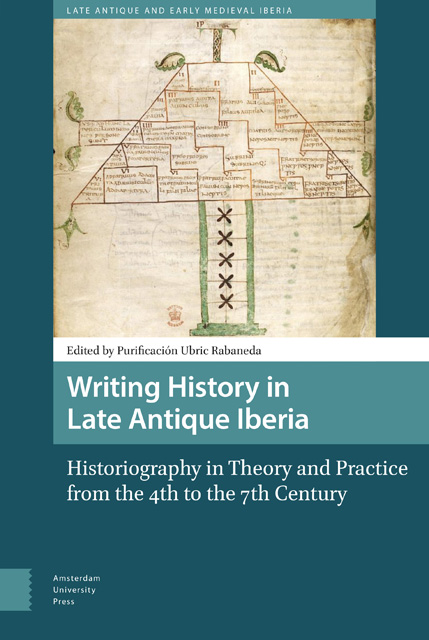 Writing History in Late Antique Iberia
Writing History in Late Antique Iberia Book contents
- Frontmatter
- Table of Contents
- 1 Writing History in Late Antique Iberia: Theory and Praxis
- 2 Para qué sirve la Historia : Principios teóricos de la historiografía hispana tardoantigua
- 3 From Christian Historiography to the Emergence of National Histories : Spanish Historiography between Romans and Visigoths
- 4 Orosius: An Iberian Patriot’s History of Rome
- 5 Orosius, Barbarians, and the Christian Success Story
- 6 Prophecies and Omens of the Fall of the Roman Empire in the Chronicle of Hydatius of Lemica
- 7 La dimensión política de los historiadores del reino visigodo de Toledo
- 8 The Definitions and Uses of Historia in Isidore of Seville
- 9 Bishops and Their Biographers : The Praxis of History Writing in Visigothic Iberia
- 10 Local Powers and Construction of the Past in the Visigothic Kingdom of Hispania
- 11 The Contemplation of the Past in the Libellus Precum of Faustinus (and Marcellinus)
- 12 Orthodoxy and Heterodoxy : The Historiography of Hispania in Late Antiquity
- 13 Expulsados de la Historia : El argumento histórico en la polémica antijudía hispana (siglos IV-VII)
- 14 Consideraciones sobre la temporalidad en las Vitae Sanctorum visigóticas
- 15 The Image of Leovigild as Arian Monarch in the ‘Vitas Patrum Emeritensium’ : From Historical Reality to Hagiographical Deformation
- Index
2 - Para qué sirve la Historia : Principios teóricos de la historiografía hispana tardoantigua
Published online by Cambridge University Press: 18 April 2023
- Frontmatter
- Table of Contents
- 1 Writing History in Late Antique Iberia: Theory and Praxis
- 2 Para qué sirve la Historia : Principios teóricos de la historiografía hispana tardoantigua
- 3 From Christian Historiography to the Emergence of National Histories : Spanish Historiography between Romans and Visigoths
- 4 Orosius: An Iberian Patriot’s History of Rome
- 5 Orosius, Barbarians, and the Christian Success Story
- 6 Prophecies and Omens of the Fall of the Roman Empire in the Chronicle of Hydatius of Lemica
- 7 La dimensión política de los historiadores del reino visigodo de Toledo
- 8 The Definitions and Uses of Historia in Isidore of Seville
- 9 Bishops and Their Biographers : The Praxis of History Writing in Visigothic Iberia
- 10 Local Powers and Construction of the Past in the Visigothic Kingdom of Hispania
- 11 The Contemplation of the Past in the Libellus Precum of Faustinus (and Marcellinus)
- 12 Orthodoxy and Heterodoxy : The Historiography of Hispania in Late Antiquity
- 13 Expulsados de la Historia : El argumento histórico en la polémica antijudía hispana (siglos IV-VII)
- 14 Consideraciones sobre la temporalidad en las Vitae Sanctorum visigóticas
- 15 The Image of Leovigild as Arian Monarch in the ‘Vitas Patrum Emeritensium’ : From Historical Reality to Hagiographical Deformation
- Index
Summary
Abstract
In recent years, Late Antiquity historiography has been analysed from different perspectives, although there is a growing interest in the comparison between ancient authors and modern historians. In this sense, authors and works present some common elements, which allow us to speak of a new way of writing history. The historical discourse of this period presents a new profile: a moderate use of the rhetorical means, the desire for truthfulness or, at least, the verisimilitude of the story, the ability to persuade to the reader, the instructional purpose of the writings, among others. But also some new elements, such as anonymous protagonists, new scenarios of everyday life and a new theological-based political theory.
Keywords: Historiography, Epistemology, Christian historiography, Pagan historiography, Political theory
Para qué sirve la Historia (antigua) o tardoantigua no es una interrogante nueva, ni siquiera desde la vertiente historiográfica, pero sí de recurrente actualidad. Al contrario, es una ‘vieja’ cuestión de la epistemología histórica, que atañe, en principio, a la duda razonable sobre la utilidad o inutilidad de la Historia (Antigua) como instrumento gnoseológico, como saber, en la medida en que todo conocimiento – y el histórico tal vez más- no debería ser considerado un fin sino precisamente un medio, un instrumento capaz de cambiar no sólo nuestra percepción del pasado sino también nuestra comprensión del presente. En definitiva, una actitud coherente con la conciencia crítica del mundo y la sociedad que se presume en el acervo del historiador, que no reconstruye el pasado de forma arbitraria sino mediante un conocimiento sujeto a reglas y métodos y, ante todo, con una hermenéutica peculiar para interpretar los testimonios del pasado y determinar su fiabilidad contrastados con otros coetáneos o posteriores y, en suma, para valorar los hechos en cuanto referentes válidos de un pasado meticulosamente analizado.
Por eso una reflexión sobre los ‘principios teóricos’ que conforman el discurso historiográfico pasado y presente, antiguo o reciente, sobre la Hispania tardoantigua no puede limitarse a una mera descripción de contenidos o a una lista – si larga- de autores, obras, fechas de publicación y ediciones, sino que en todo caso debe intentarse una revisión crítica de los mismos que, en muchos casos puede y debe implicar una re-interpretación, en la línea del ‘historical rethinking ’ anglosajón de K. Jenkins, por ejemplo, o del ‘pensar históricamente ’ del francés P. Vilar, entre otros.
- Type
- Chapter
- Information
- Writing History in Late Antique IberiaHistoriography in Theory and Practice from the 4th to the 7th Century, pp. 21 - 42Publisher: Amsterdam University PressPrint publication year: 2022


